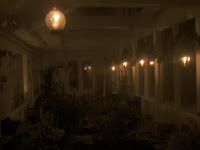01 02 12 Christmas: the Light Entering the World
“The true light that gives light to everyone was coming into the world.” John 1:9
There is great wisdom in placing the Christmas celebration at the darkest time of the calendar year. If we think of God as the Maker of all that is good—as the source (the true light) of the light that we find in our dark world—and if we think of Jesus as that source bearing light to us, then putting the celebration of Jesus’ birth in the darkest season is a true inspiration.
Most of my adult life has been about living in 
This is why we bought our bioshelter home. We bought the bioshelter first, so that we would live in a way that is more consistent with what God desires—a “greener” home, and a more relational approach to the land and our neighbors. The second reason we bought the home was to create hospitable space for the conversations and fellowships that would inspire all who enter to live more relationally in the world. We know that we cannot succeed in living better if we try to do it alone; we need allies and inspirers. Similarly, we know that others would make changes, too, if they had inspiration and allies. Perhaps we can be that for each other.
As you can see, for me, preparing for Christmas has to do with thinking about what constitutes the “darkness” and how it is that God brings “light.” It is with this in mind that I found myself writing a piece on Christmas. Even though Christmas is past, I share it here as a part of this season of “light coming into the darkness.”
On Christmas
Even though Jesus’ birth occ
Why are the emotions that come with the Christmas message so often the feelings of awe and wonder? I think it is because the birth of Jesus is full of mystery.
- There is the mystery of how the infinite God can somehow be fully present in the person and life of a finite human being;
- There is the mystery of why God chooses to be in relationship with sinful and destructive creatures like human beings;
- And there is the mystery of how God, in taking on the human-creature-identity, manages to get hold of us and transform our sinful and destructive identity into something new—an identity that causes us to work for personal and collective good.
This year, though, it is hope more than awe that has captured my attention. That God would choose to enter into relationship with us at our worst seems counter-cultural and even subversive. It is that very subversiveness—God’s insistence that something better can and must happen—that sparks the hope in me. For, though Christ’s birth embodies God’s insistence on being in relationship with all creation, we live in a time that seems to take pride in denying relationships.
- 21st Century America is a place where people seem reluctant to believe in committed relationships, these days deferring even marriage and children to an older age than every before, or even avoiding marriage altogether and settling for temporary relationships.
- At the same time Americans have developed an abiding faith in no-fault divorce, and over half of America’s marriages end that way.
- Politics has entered an amazingly self-righteous stage, where our two-party system seems dominated by the extremes of both the left and the right. The extremist leadership regularly refuses any way of being in relationship with members of the other party except that which must lead to political animosity and gridlock.
- This same age of polarization has also entered pews of our churches, so that congregations, and even denominations, often choose to split rather than hang in together, despite Jesus’ clear call for unity and mutual forbearance.
That the Holy God chooses to enter into relationship with rather unholy creatures, rather than separate is amazing. That God chooses to take on our identity as God’s own in Jesus is downright subversive.
For me profundity of that birth has been life changing. It has meant for me a life of trying to live in ways that do not give up on others, because in Jesus Christ I have learned that God does not give up on us. For me it has meant recognizing that we do, indeed, live in a time of deep darkness. In fact, sometimes the darkness has seemed overwhelmingly profound to me. But the birth of Jesus moves me beyond seeing only darkness. Again and again, and without fail, it has also moved me to live for the light that shines in the darkness. I hope it will continue to mean that for others, too.



Comments
Post a Comment